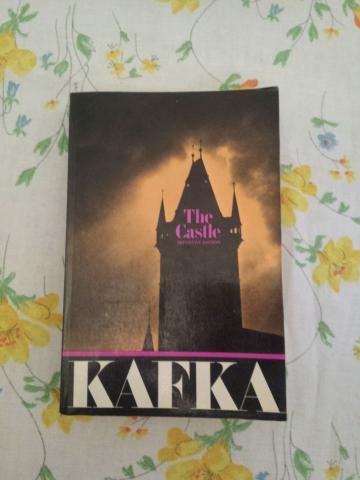Book Review: Franz Kafka's "The Castle"
Jun 09,2015
An eccentric-but-capable government functionary arrives in a remote town populated by quaint folk and enlists their aid in getting to the bottom of a mystery that leads him down a long and winding road filled with frustrating set-backs and shocking revelations. No, this is not a synopsis of Twin Peaks, the classic 90's TV series created by surrealist filmmaker David Lynch. This is a synopsis of The Castle, the second unfinished novel written by absurdist author Franz Kafka. Unfinished not because of Kafka's untimely death, but because of his inability to find a suitable ending, as he explained to his dear friend and literary executor Max Brod. It is a shame that readers can only speculate on what the ultimate fate of K. (the aforementioned eccentric-but capable government functionary) is, but what Kafka did leave us with is an intriguing account of a slow-placed existentialist nightmare, one that makes it's dreary way to it's uncertain conclusion.
At the very beginning of the book, Kafka lets readers know what they're in for. After a presumably long journey, K. arrives late at night just outside the village. Before making his way into the village and from there the titular castle, we learn that, "K. stood for a long time gazing into the illusory emptiness above him" (pg. 3), a statement which could easily summarize the experience of readers as they make their way through The Castle. A land-surveyor, K. claims to the townsfolk that he was summoned by the bureaucracy operating from within the castle and seeks to know what his function in his new home is, only to to be referred to Klamm, the elusive resident of the castle and an enigmatic figure of whose appearance the villagers can only agree on one thing: "he always wears the same clothes, a black morning coat with long tails" (pg. 231). From here on out, Kafka's tale chronicles the various twists and turns that K. futilely attempts to navigate in his search for the rarely-seen castle authority. He moves from villager to villager, official to official, in the hope that the next person he speaks with will be able to grant him an audience with Klamm only to learn each time that not only is that person unable to put him in touch with Klamm, but he has even more hurdles to overcome, whether they be seeking out other supposedly well-connected individuals or the byzantine bureaucratic procedures that Kafka is so famously fond of describing. For instance, he learns early on that Frieda, a former barmaid at the Herrenhof inn, is Klamm's lover and promptly initiates a romantic relationship with her in the belief that marrying her will bring him closer to his goal. However, she proves like the others to be unable to secure a meeting with Klamm, and K. pushes her to the side for the bulk of the novel and only expresses regret when Frieda leaves him for Jeremiah, who ironically was sent by Klamm to assist K.
Many of the characters K. encounters on his quest are strange or simply finding themselves in strange circumstances. The aforementioned Jeremiah and his associate Arthur are assistants assigned to K. in order to make his experience in the village enjoyable, although K. finds himself irritated by their excessively-attentive attitude, as seen when they take it upon themselves to sleep in the same room as K. and Frieda when they stay at the schoolhouse and get him fired from his post as janitor when they break into a nearby woodshed to get firewood and blame him for the damage. Another more tragic example is Amalia, sister of castle messenger Barnabas and thus worthy of K.'s attention. Although K. approaches Olga, her older sister, in order to get information about her, he abandons his plans when he learns from Olga that she as a whole have been ostracized in the community ever since one particularly lecherous castle functionary named Sortini made sexual advances that she rejected, bringing shame upon the family as a whole. These characters appear and then fade into the background, returning to the forefront only when K. has reason to believe they can help him. Some readers might take away nothing from these these interactions and events other than that they seem unconnected and meaningless, and in their defense, they are right. At first glance, they appear to be unfruitful wastes of time for both K. and the reader, but as the beginning of the book said, the emptiness is illusory. All the running back and forth, all the conversations that go nowhere, all the relationships that fade away: is this not an apt description of modern life? All this in pursuit of the same thing as K.: purpose, although one can only wonder how much purpose someone whose name means "illusion" in Czech, one of the languages Kafka was fluent, in can confer. Indeed, K.'s faith in Klamm is misplaced as by the novel's abrupt end, he is no closer to Klamm than he was at the book's beginning.
Understandably, however, many might be turned off by not only the soul-crushing story unfolding before them but also by the dispassionate and at times outright dull way it is told. Without sympathy and without malice, Kafka chronicles K.'s travails in a matter-of-fact manner so utterly devoid of emotion that it would make Mr. Spock red with envy. It is well-known among Kafka fans that the tales he weaves are infinitely more interesting than the prose in which he writes them, but new readers might find it hard to work through. The silver lining of Kafka's clinical style of writing is that it doesn't leave much room for the rhetorical flourishes and narrative tangents that other authors are inclined towards, allowing him to get directly to the point when explaining a particular event or exchange. It also has the side effect of reinforcing the novel's existentialist sensibilities, in that the only meaning or sentiments readers discern in the text are ones the reader makes out of them. Only a fool would go as far to say that Kafka wrote the book without any emotions or feelings whatsoever, but he did manage to write in such a way that they did not manifest in the prose, which is quite an accomplishment in this writer's eyes.
Like Kafka's other unfinished novel The Trial, The Castle paints a picture of despair, where action is futile and purpose is an illusion at best and a lie at worst. Unlike the similarly-named protagonist of The Trial, K. is an agent of the system rather than a target of it, yet in the end he is just as much a victim of it as Josef K. It seems that in the world envisioned by Kafka, there is no escape from this system, as it ultimately gets what it wants, however inscrutable it may be, whether it be by executing those, like Josef K., who rebel against it or stripping of purpose those who attempt to abide by it, as happened with K. No escape, save for one. While K. is bickering with the landlady of the Herrenhof, she calls him the most ignorant man in the village and warns him against continuing his pursuit of Klamm. Undeterred, K. responds, "Of course I'm ignorant, that's an unshakeable truth and a sad truth for me, but it gives me all the advantage of ignorance, which is greater daring, and so I'm prepared to put up with my ignorance, evil consequences and all, for some time to come, so long as my strength holds out. But these consequences really affect nobody but myself, and that's why I simply can't understand your pleading," (pgs. 72-73). In a world that can at times be truly Kakaesque, the only real consolation is coming to terms with your deficiencies, mapping and going your own way. This is the message from The Castle, a highly-recommended cautionary tale for readers still trying to make their way through young adulthood and by extension life itself.






